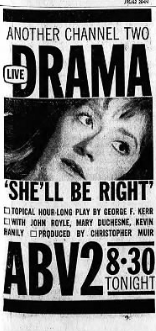Bill Bain was an Australian television and film director.
The Gold Coast Classic was a professional golf tournament played at Coolangatta & Tweed Heads Golf Club in northern New South Wales, Australia. It was held from 1978 to 1983. From 1979 to 1983 it was sponsored by Tooth and Co., a beer brewery, initially under their name but from 1982 under the name Resch's Pilsner.

The Victorian Open is an annual golf tournament held in Australia. It was founded in 1957 and is the Victoria state open championship for men. It is run by Golf Victoria and is a Golf Australia national ranking event.
The New South Wales Open is an annual golf tournament held in New South Wales, Australia. The event was founded in 1931 as the New South Wales Close Championship, being restricted to residents of New South Wales, becoming the New South Wales Open Championship in 1958 when it was opened up to players from outside New South Wales. Norman Von Nida won the event six times, while Jim Ferrier and Frank Phillips won it five times with Greg Norman winning it four times.

Uneasy Paradise is a 1963 Australian television film directed by William Sterling. It is a 60-minute drama set in Melbourne about a gambler married to Sally. He loses much money at a club run by Paolo.
"Plain Jane" is a 1966 Australian TV movie. It stars Elspeth Ballantyne and was produced by Oscar Whitbread for the ABC. "Plain Jane" aired on 5 January 1966 in Sydney and Melbourne, and on 25 May 1966 in Brisbane.
The Man Who Shot the Albatross is a play by Ray Lawler about the Rum Rebellion, first performed in 1971. A 1972 television film featured the stage cast.
"The Tower" is a 1964 TV play broadcast by the Australian Broadcasting Corporation. It aired on 2 December 1964 as a stand-alone in Melbourne and on 28 April 1965 as part of Wednesday Theatre in Sydney. It aired on 6 January 1965 in Brisbane. It was based on a play by Hal Porter and directed by Christopher Muir in the ABC's studios in Melbourne.

She'll Be Right is a 1962 Australian television play which aired on the ABC.
Man of Destiny is a 1963 Australian television play directed by Christopher Muir. It was based on the 1897 play Man of Destiny by George Bernard Shaw. Just like the play it revolves around the early career of Napoleon Bonaparte.

The Prisoner is a 1962 Australian television play based on a play which had been filmed with Alec Guinness. Many Australian TV dramas at the time were based on overseas stories.

Barnstable is a 1963 Australian television play which had been performed on British TV. It was filmed in Melbourne. Sandra Power was the barrell girl from In Melbourne Tonight making her acting debut.
Double Yolk is a 1963 Australian television play. It adapts two short plays, "By Accident" and "With Intent". Both were by Hugh and Margaret Williams who had written The Grass is Greener.
A Local Boy is a 1964 Australian TV play produced in ABC's Gore Hill Studios in Sydney. Australian TV drama was relatively rare at the time.
"Salome" is a 1968 Australian TV play starring Frank Thring. It was based on the 1891 play of the same name by Oscar Wilde and was reportedly the first time that play had been adapted for television.
John Croyston was an Australian writer, radio producer and director.
"Moby Dick - Rehearsed" is a 1965 Australian TV play based on the 1955 play Moby Dick - Rehearsed by Orson Welles. It was shot in Sydney.
"Shadow on the Wall" is the 15th television play episode of the second season of the Australian anthology television series Wednesday Theatre. It was recorded in 1967 as part of Australian Playhouse but was not aired until 10 April 1968 in Melbourne and Sydney. as part of Wednesday Theatre. It was a rare contemporary Australian TV drama to address the Vietnam War. It ran for 30 mins.

The Devil Makes Sunday is a 1962 Australian television play by New Zealand -born author Bruce Stewart. It was broadcast live from Melbourne, and taped and shown in other cities at a later date.
Carole Potter was an Australian actor best known for her work in the early days of Australian television. She was born in England and moved to Australia in 1957. Her TV debut was made when she was 15 in The Governess. She married director William Sterling with whom she often collaborated.






